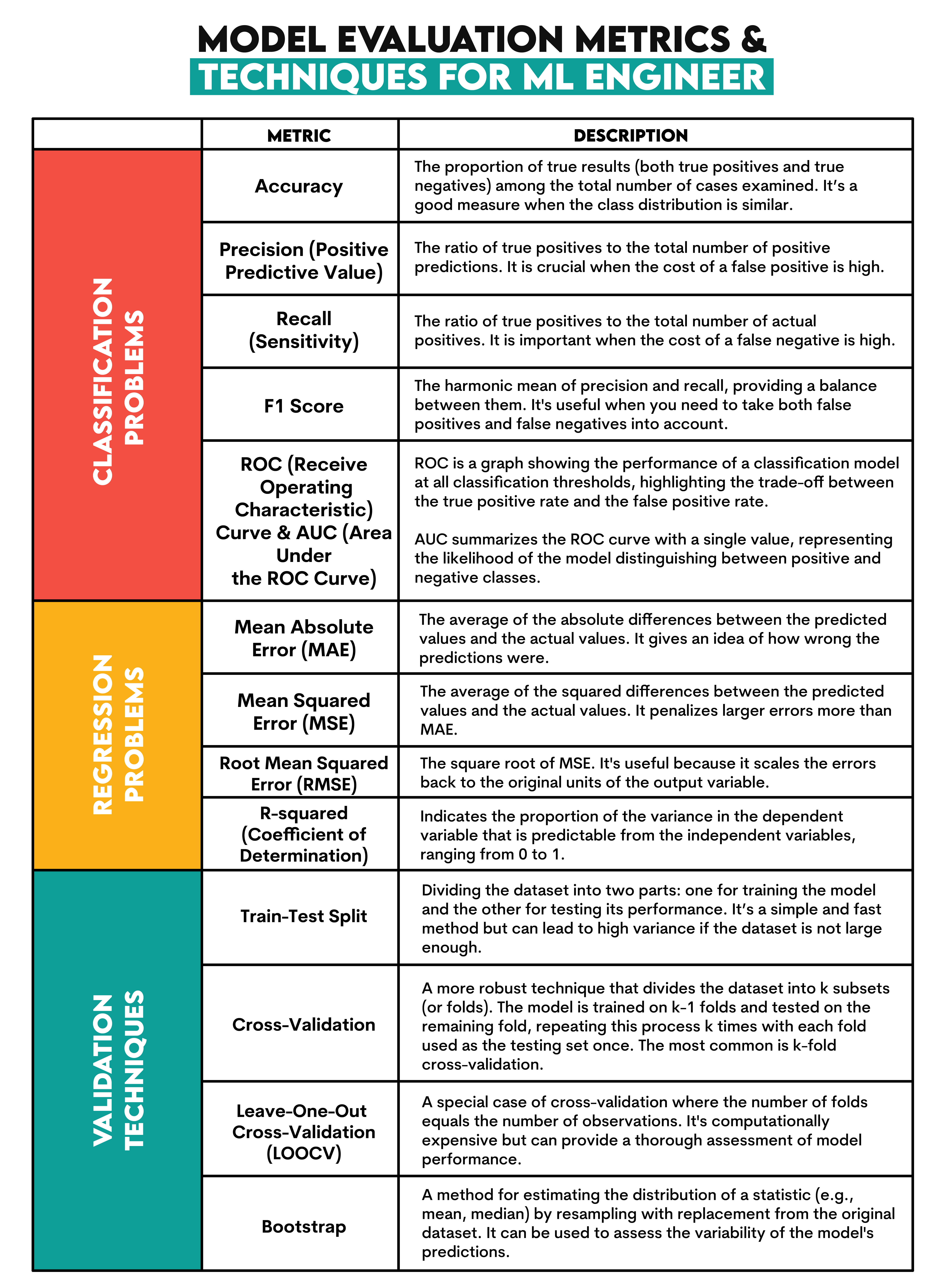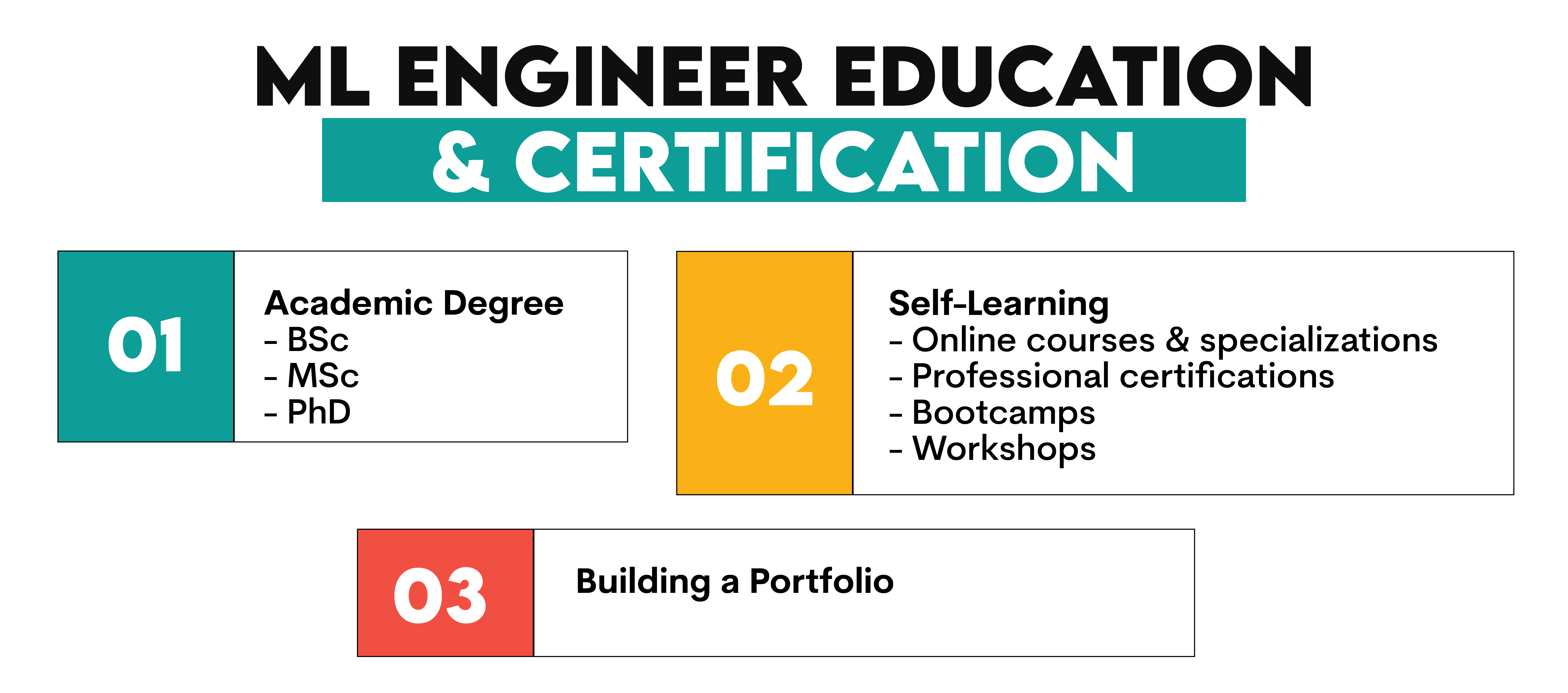What Does a Machine Learning Engineer Do?

 Written by:
Written by:Nathan Rosidi
What exactly does a machine learning engineer do, and how? What skills do they need? This article will teach you things you didn’t even know you wanted to know.
If machine learning is all about models making predictions and decisions without being explicitly programmed to perform a task, who are then machine learning engineers? People who explicitly don’t program things that then magically work?
Yeah, it does sound other-worldly. But it’s not. There’s no magic, just complex skills, plenty of learning, and diverse job responsibilities — very earthly things!
Let’s then – excuse my pun – unearth them better to understand the role of a machine learning engineer.
Who is a Machine Learning Engineer?
Machine learning is a field that combines data, statistics, and software expertise. And this is what machine learning engineers are: a blend of a data scientist and a software engineer.
Their focus is designing and implementing machine learning applications.
How do they do that? By developing algorithms that can learn and make decisions. What purpose do these algorithms serve?
Let’s take a look at that in the following section.
Real-Life Projects Machine Learning Engineers Work On
Machine learning has a broad application, as it shown it can solve diverse real-world problems. The most common ones are shown in the figure below.

1. Recommendation Systems
Description: Developing algorithms to recommend products, movies, music, or content to users based on their past behaviors and preferences.
Industries: E-commerce, streaming services, social media.
Impact: Enhances user experience by personalizing content, increasing user engagement, and boosting sales or viewership.
2. Predictive Maintenance
Description: Utilizing machine learning to predict when equipment or machinery is likely to fail or require maintenance, based on historical data, sensor data, and real-time monitoring.
Industries: Manufacturing, aerospace, utilities, transportation.
Impact: Reduces downtime and maintenance costs, improves safety, and increases operational efficiency.
3. Fraud Detection Systems
Description: Designing models to identify potentially fraudulent transactions or behaviors in real-time by analyzing patterns and anomalies in transaction data.
Industries: Banking, finance, insurance, online retail.
Impact: Minimizes financial losses, protects consumer information, and enhances trust in financial systems.
4. Autonomous Vehicles
Description: Working on algorithms for self-driving cars, including perception (object and obstacle detection), localization, decision-making, and control systems.
Industries: Automotive, transportation, logistics.
Impact: Aims to improve road safety, reduce traffic congestion, and revolutionize transportation.
5. Natural Language Processing (NLP) Applications
Description: Developing applications such as chatbots, language translation services, sentiment analysis, and voice-activated assistants, leveraging NLP techniques to understand, interpret, and generate human language.
Industries: Customer service, education, entertainment, healthcare.
Impact: Enhances user interaction, breaks language barriers, provides insights from text data, and improves accessibility.
6. Computer Vision for Medical Diagnosis
Description: Using image recognition algorithms to analyze medical images (X-rays, MRIs, CT scans) for the early detection and diagnosis of diseases.
Industries: Healthcare, medical imaging.
Impact: Assists radiologists and doctors in making more accurate diagnoses, potentially saving lives through early detection.
7. Supply Chain Optimization
Description: Implementing machine learning models to forecast demand, optimize inventory levels, and improve logistics, based on historical sales data, market trends, and external factors.
Industries: Retail, manufacturing, logistics.
Impact: Reduces inventory costs, improves customer satisfaction through better product availability, and enhances operational efficiency.
8. Sentiment Analysis for Brand Monitoring
Description: Analyzing customer feedback, social media posts, and reviews to gauge public sentiment about a brand, product, or service, enabling companies to respond proactively to consumer needs and perceptions.
Industries: Marketing, retail, hospitality, social media.
Impact: Informs marketing strategies, product development, and customer service practices, helping brands maintain a positive image and address issues promptly.
Key Responsibilities of a Machine Learning Engineer
Once we pinpoint its responsibilities, the role of a machine learning engineer will become much clearer.

1. Data Preprocessing and Analysis
Before any model can learn, the data must be ready. Engineers spend a significant amount of time collecting, cleaning, and organizing data. This involves handling missing values, encoding categorical variables, normalizing data, and more. The goal is to transform raw data into a format that is suitable for analysis and model training.
2. Developing Machine Learning Models
Once data is ready, machine learning engineers can start developing models. In practice, this means you need to find the appropriate algorithm (or several) for your machine learning problem. Then you have to train and tune it to reach the best possible performance. Important steps in this stage are feature selection and regularization, which you should be familiar with.
3. Testing and Validation
Developing an ML model is not the end of your work. You must evaluate the model’s performance using metrics and techniques such as accuracy, precision, recall, and the ROC curve (for classification models) or Mean Squared Error (MSE) and Root Mean Square Error (RMSE) (for regression tasks). One of the main goals of this stage is to detect and solve model overfitting or underfitting.
4. Deployment and Integration
Deploying it into production is how the model starts its real life. Machine learning engineers integrate models into the company’s existing systems, ensuring they (models, not engineers) run as they should. In doing that, ML engineers collaborate with software developers to develop systems for monitoring the model’s performance.
5. Optimization and Scalability
After deploying models, ML engineers' next step is to optimize them and ensure their scalability. This is achieved by retraining models with new data or fine-tuning algorithms, for example.
6. Collaboration With Stakeholders
Very often, all the above responsibilities also include collaborating with other data team members or people from different departments. This can involve working with data scientists, other tech colleagues, or business leads. In this collaboration, ML engineers have a two-fold role: they need to understand the business problems and translate them into tech language, and then translate what the model does back into business language.
Skills Required to Become a Machine Learning Engineer
To be a successful machine learning engineer (or get a job in the first place), you need to have a quite rare combination of quite rare skills.
Technical Skills
There are four main technical skills asked of machine learning engineers.

1. Programming Languages
ML engineers most often use R and Python. The latter one is especially popular due to its simplicity and numerous data science and ML learning libraries, such as:
Here’s an overview of Python libraries that ML engineers commonly use.

2. Machine Learning Algorithms
Machine learning engineers need to use a diverse array of algorithms to solve problems and extract insights from data. Each algorithm has its strengths and is suited to specific types of tasks. Knowing which algorithms to choose and how to apply them to real data is a crucial skill.
Most commonly, you will use these algorithms:
- Linear regression
- Logistic regression
- Decision trees
- Random forest
- Support vector machines (SVM)
- K-nearest neighbors
- K-means clustering
- Gradient boosting machines (GBM)
- Neural networks/deep learning
- Principal component analysis (PCA)
Here’s an overview of the algorithms and their use.

3. Data Modeling and Evaluation
Since building machine learning models is a core ML engineering task, it’s expected that you’re very good at it. We learned what that encompasses: preparing data, choosing the right algorithm, building a model, and evaluating its performance.
These metrics and techniques are:
- For Classification Problems
- For Regression Problems
- Validation Techniques
Here’s an overview of these metrics and techniques.

4. Software Engineering and System Design
ML engineers also need a strong knowledge of software engineering. They integrate the models into an existing system, and this integration has to go as smoothly as possible without negative impacts on the system's performance. This requires understanding how software’s design and dependencies.
Analytical Skills
Along with technical skills, ML engineers’ strong side is their analytical mind.

1. Statistical Analysis and Mathematics
Building ML models is nothing but mathematics and statistics translated into programming languages, usually Python. This knowledge includes:
- Probability distributions
- Conditional distributions
- Bayes’ theorem
- Random variables
- Probability density and mass functions
- Joint, marginal, and conditional distributions
- Central limit theorem
- Law of large numbers
- Markov chains
- Bayesian networks
Here’s an overview of these concepts.

2. Problem-Solving
ML engineering is a creative job, as it requires finding custom-made solutions for very specific problems. You can’t just copy-paste a solution from another company. Even if you could, what’s the point in doing exactly the same thing as your competitors; I reckon you want to do better than them. So, understanding the core of the business problem, being creative in finding hypothetical solutions, and testing them to find the best one is what makes the difference between a great ML engineer and an average one. Great coding skills can’t do anything if you lack problem-solving ideas.
3. Data Intuition
You need to have a feeling for data. I don’t mean you need to be emotionally attached to it. No, I mean you can intuitively understand if some data makes sense or not. This helps you recognize errors in data. Also, if you conceptually understand particular data, you will recognize patterns within it more easily, which will help you in balancing the model’s complexity and performance.
Soft Skills
Machine learning engineers don’t work alone on a deserted island (with internet access). Many would probably like that. But, despite their wishes, the work of ML engineers happens in a business surrounding and in interaction with other people.
So, you will need these three soft skills.

1. Teamwork and Collaboration
Besides ML engineers, other experts are also involved in machine learning projects. For example, data professionals, such as data scientists, data engineers and software engineers. These projects also have to include the business side, which is represented by product managers, business analysts, and other business leads.
2. Effective Communication
Of all these people ML engineers collaborate with, not everybody is tech-savvy enough to understand ML models without explanations. So, machine learning engineers must be able to switch between tech and business languages. Building a great ML model is not enough. You need to explain what your model does, how it does it, and why you recommend its implementation. Effective communication also makes coordinating multi-departmental teams and ML project stages easier; you need to be aware of and communicate the implications of your work on others’ work and vice versa.
3. Continuous Learning
Machine learning is currently at the forefront of technological advancements. The speed of technological changes is ever-increasing, and the same applies to machine learning. So, you need to be aware that new things will come your way all the time. You won’t need to take on all of them, that’s impossible. But you’ll for sure need to learn continuously, especially when it comes to algorithms and new tools you’ll use.
Educational Pathways and Certifications
It’s blatantly obvious that machine learning sits at the crossroads of several fields, most importantly computer science, mathematics, and statistics. Business knowledge is also required to apply the technical skills in a useful manner.
You’re asking if your education needs to include all that. I’m afraid so; there’s no shortcut to becoming a machine learning engineer.
As for your education options, there are three main approaches for gaining the most comprehensive knowledge possible. Ideally, you’ll combine all three.

1. Academic Degree
While an academic degree is not always a prerequisite, ML engineers very often have one from one of several relevant fields.
Start With Bachelor’s: Machine learning engineers typically hold at least a bachelor’s degree in computer science, data science, statistics, or some other related quantitative field. Not surprisingly, this degree provides a strong foundation in programming languages, statistics, algorithms, and linear algebra. Incidentally, just what machine learning is all about.
Specialize With a Master’s: After getting a bachelor’s, your next step would ideally be getting a master's degree in the fields I mentioned earlier. Doing so would allow you to go deeper into AI and ML, for example, into neural networks, deep learning, natural language processing, etc.
Research Through a Ph.D.: You can go even further by getting a Ph.D. in ML or AI. This often leads to an academic career but not necessarily so. Doing a Ph.D. will put you under the guidance of top faculty experts and allow you to contribute new knowledge, even inventions, to the field. If you are interested in applying your findings to the business world yourself, the employers will be chasing you like mad! Or you can become an employer yourself, Herr or Frau Professor Doktor!
2. Self-Learning
Academic education should be complemented with online courses specialization, professional certifications, workshops, boot camps, and more.
This is in an ideal world. If you don’t have an opportunity for an academic education, then self-learning is your best alternative.
Online Courses and Specializations: Coursera, edX, and Udacity are among the most popular platforms for tech courses and specializations. Many of them are provided by established universities or industry’s most respected companies and experts. Some of the courses I would suggest are:
- Deep Learning Specialization by Andrew Ng (Coursera)
- MicroMasters Program in Statistics and Data Science (edX)
- AWS Machine Learning Engineer Nanodegree (Udacity)
Professional Certifications: Having professional certifications on your CV is what employers like. It is a testament to your expertise and willingness to learn.
Here are some certifications I’d recommend.
- Google Cloud Professional Machine Learning Engineer: For certifying ML model designing, building, and deploying skills on the Google Cloud Platform.
- AWS Certified Machine Learning - Specialty: Same as above, only using AWS Cloud.
- Microsoft Certified: Azure AI Engineer Associate: Same as above, but using Microsoft Azure.
Bootcamps: They are the same as courses, only the more intense way of learning. Also, they usually offer more comprehensive and more practical knowledge than courses.
When choosing a bootcamp, consider factors such as curriculum relevance, learning format (online or in-person), time commitment, career support services, and alumni outcomes. Attending a bootcamp can be a significant investment in your future, so it's important to select one that aligns with your career goals and learning preferences.
These three will provide you with comprehensive knowledge.
- Data Science Bootcamp (Springboard): It covers a broad range of topics, from data wrangling and statistical analysis to advanced machine learning techniques. The program is project-based, allowing students to build a portfolio of work.
- Data Science Bootcamp (Flatiron School): It covers a comprehensive range of topics, including machine learning, statistical analysis, Python programming, and more.
- Data Science Bootcamp Online (BrainStation): The program is designed to equip students with the knowledge and tools to apply data science techniques and machine learning algorithms to solve business problems.
Workshops & Conferences: Attending – online or in-person – workshops, conferences and meetups gives you the opportunity to connect with industry experts and be in touch with the latest developments. Both very important for your career as an ML engineer.
3. Building a Portfolio
Doing machine learning projects is necessary for ML engineers to learn how to apply theoretical knowledge to practical problems. For example, you could solve machine learning projects on Kaggle, DataCamp, or StrataScratch. One by one project, and there you have it – a project portfolio.
Here are some of my suggestions:
- Regression Project: Property Click Prediction by NoBroker
- Classification Project: Prediction of Stock Price Direction by Neurotrade
- Clustering Project: Driver Lifetime Value by Lyft
- NLP Project: Keyword Detection on Websites by PeakData
You can share them on GitHub, where you can also contribute to open-source machine learning projects.
Challenges in the Career of Machine Learning Engineers
I am sure the biggest challenge currently for most of you is getting an ML engineer job. Once you do get it, you will be on the course for an interesting and rewarding career. However, this does not come without challenges. You need to have them in mind to stay on course.

1. Keeping Pace With Rapid Technological Advances
I already discussed how ML changes very fast. Once you start working, you’ll very soon be facing some new algorithms, tools, and practices. Keeping pace with all that is not easy, especially as the job itself can be overwhelming. You can’t run from one technology to another like a headless chicken. It’s important that you stay current but also learn something that will add value to your expertise, not just for the sake of learning something new.
2. Data Quality and Availability
Machine learning models are nothing but some algorithms applied to some data. It might be a simplistic way of describing it, but this is to show how essential data is in ML. The models are nothing without the high quantity of high-quality data.
Regarding availability, you might not always be able to get all the data you ideally need. There are privacy issues or simply a lack of available data in general. You either need to find a way to work around that or make do with limited machine learning possibilities.
As for data quality, you’ll spend a considerable amount of time making your data suitable for an ML model. This involves dealing with incomplete, messy, inconsistent, or unstructured data. Not always a walk in the park!
3. Model Complexity and Explainability
ML engineers must be able to understand and explain the models they build. This becomes increasingly difficult with the model’s complexity, especially when talking about deep learning, also known as ‘black boxes’.
Add to that an increasing need to comply with regulators, and you see how challenging this can be. How do you make something even you don’t fully understand comply with some rules? This is something you’ll need to answer in the coming years.
4. Ethical Considerations and Biases
The regulatory rules are, at least partially, driven by ethical considerations. They relate to the sometimes questionable ethicality of sourcing your data. They also relate to possible biases ingrained in your model. You need to make sure your model is as fair as possible so as not to discriminate or enforce certain negative stereotypes.
5. Integration and Deployment Challenges
One of the challenges is model integration with existing systems. Your model needs to work in a real world, without (significantly) curbing the system’s performance. That’s why I talked about the importance of monitoring the model’s performance and fine-tuning it.
Conclusion
After reading this article, you hopefully realize there’s nothing magical about what machine learning engineers do. That doesn’t mean this job isn’t extremely interesting, complex, and beautiful.
If you liked what you learned about it, the only thing you need to do now is get a job. Yeah, only!
We at StrataScratch can make this at least a bit easier task. You will need a thorough job interview preparation, especially regarding technical and analytical skills. Luckily for you, this is what we specialize in.
We have 1,000+ real coding interview questions, where you can practice Python and R coding. And our data projects can help you develop other machine learning skills. As you do these projects, you’ll also be building a portfolio. Remember, this is one of the important steps in getting an ML engineer job.
Share


